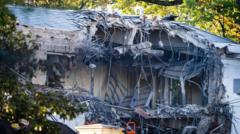Toxic haze in Delhi despite 'green' Diwali


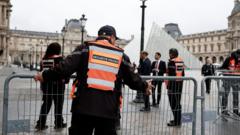

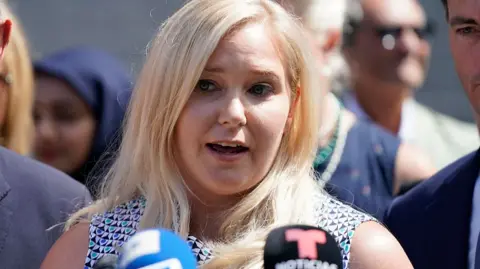 Getty Images
Getty ImagesVirginia Giuffre would have viewed Prince Andrew giving up his titles "as a victory", the ghostwriter of her posthumous memoir told BBC Newsnight.
The book, Nobody's Girl, co-written by Amy Wallace, details Ms Giuffre's encounters with convicted sex offender Jeffrey Epstein and his former girlfriend Ghislaine Maxwell - and more details of her allegations about Prince Andrew, which he has always denied.
In the memoir - released on Tuesday - Ms Giuffre described three occasions where she alleged Prince Andrew had sex with her.
Ms Wallace spent four years writing the book with Ms Giuffre, who took her own life almost six months ago.
In the book, Ms Giuffre said she had sex with Prince Andrew on three separate occasions. She says the third occasion was on Epstein's island as part of what Ms Giuffre called "an orgy" with Epstein and approximately eight other young women.
Prince Andrew, who reached a financial settlement with Ms Giuffre in 2022, announced on Friday that he was voluntarily deciding not to use his titles including the Duke of York, an honour received from his mother, the late Queen Elizabeth II.
He is also giving up membership of the Order of the Garter - the oldest and most senior order of chivalry in Britain.
But there are still calls for them to be formally removed.
Ms Wallace said: "I can speak for Virginia; I know that she would view it as a victory that he was forced, by whatever means, to voluntarily give them up."
She called it a "symbolic gesture" which has made "modern history in terms of the royal era", describing it as "a step in the right direction".
"Virginia wanted all the men who she had been trafficked to, against her will, to be held to account, and this is just one of the men.
"Even though he (Andrew) continues to deny it, his life is being eroded because of his past behaviour, as it should be," Ms Wallace said.

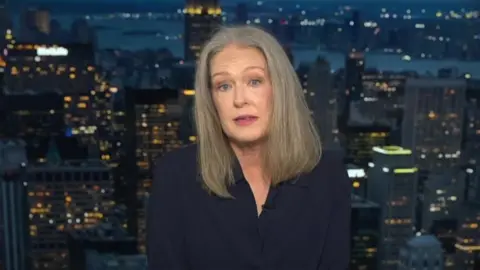
Ms Wallace went on to say there was a period when Prince Andrew "indicated he was willing to help investigators in the US" but he was "never available, for some reason".
"That's something he could still do. He could say, as he has repeatedly, 'I still deny that I was involved... however, I was in these houses and I was on that island and I was on the jet and I saw things, and I know how much these women have suffered and I would like to share what I saw," Ms Wallace said.
Ms Wallace said the private jets used by Epstein "had been remodelled in order to afford many bedrooms - they were designed as flying trafficking agents, they were there to use girls in".
She added: "Prince Andrew was on at least one of those jets that I know of, if not more.
"He has to take sort of the measure of his own moral compass - he said in his settlement with Virginia that he now acknowledges the pain that these women and young girls had suffered. If you really feel it, do something about it."
Speaking about Ms Giuffre, Ms Wallace said: "I'm sad and I'm honoured to be able to speak at least a little bit on her behalf to stand up for her.
"She wrote this book to try to help other people, to make the world a better place.
"She deserves all credit for whatever role she played in forcing Prince Andrew to relinquish a few more of his titles but she deserves all credit even more than that for being brave enough to stand up to say 'this isn't right'."
The memoir, which the BBC bought from a book store in central London days before its official release, paints a picture of a web of rich and powerful people abusing young women.
At the centre of the abuse was Epstein and his former girlfriend, Ghislaine Maxwell, who is currently serving a 20-year sentence on sex-trafficking charges.
Ms Giuffre says that even decades later, she remembers how much she feared them both.
Epstein was convicted in Florida in 2008 for soliciting prostitution from a person under the age of 18. He died in 2019 while awaiting trial on sex trafficking charges.
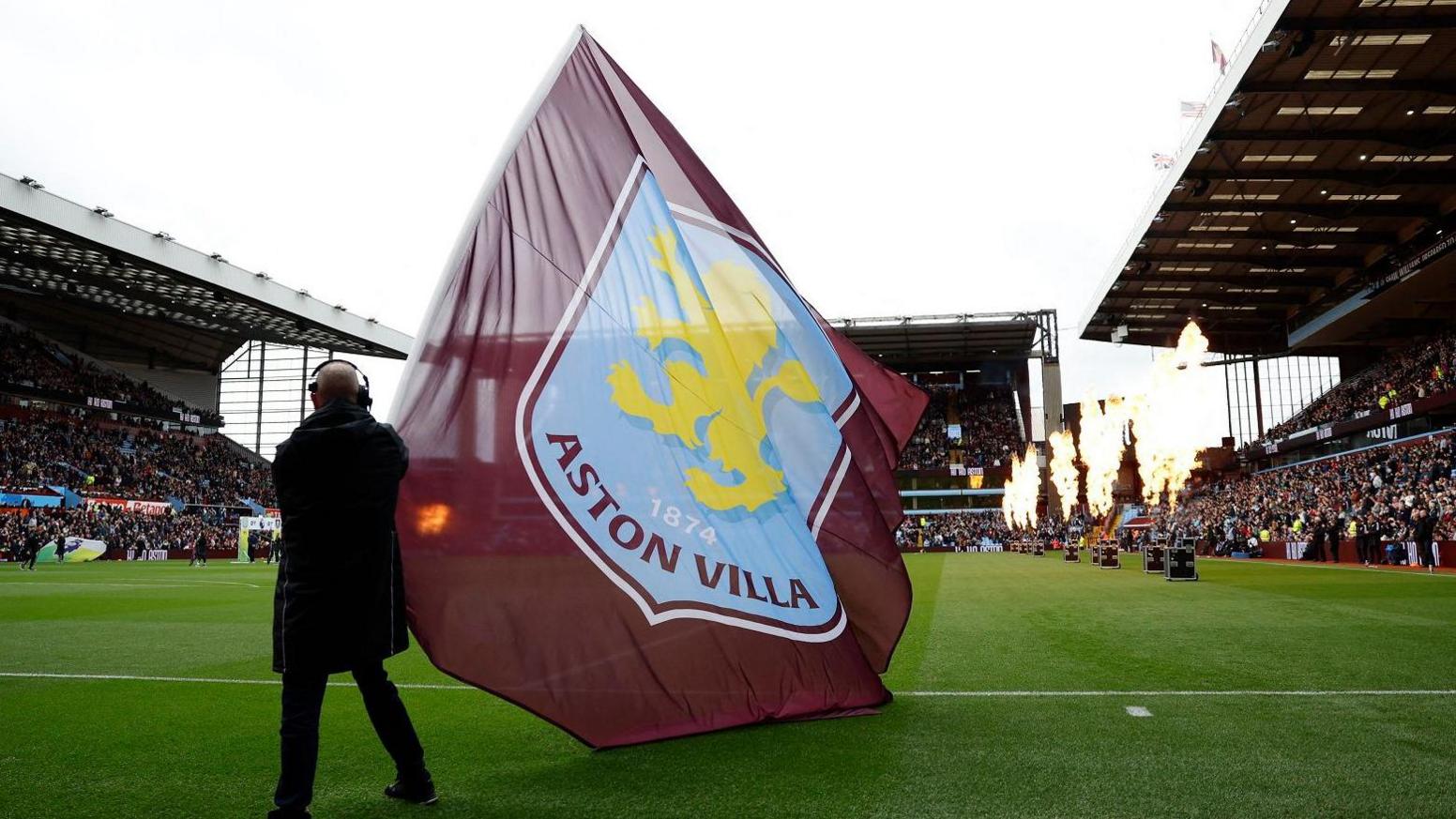
Football's European governing body Uefa said it wanted fans to be able to travel and support their team in a "safe, secure and welcoming environment".
Israeli club Maccabi Tel Aviv say they will not accept any ticket allocation from Aston Villa should the decision to ban their supporters from next month's Europa League match be overturned.
The Safety Advisory Group (SAG) - the body responsible for issuing safety certificates for matches - informed Villa no travelling fans would be permitted at the match in Birmingham last week.
The decision was widely condemned, with Culture Secretary Lisa Nandy pledging that the government will "find the resources" to allow Maccabi fans to attend earlier on Monday.
But Maccabi Tel Aviv now say supporters will not travel for safety reasons.
A club statement said, external: "The wellbeing and safety of our fans is paramount, and from hard lessons learned we have taken the decision to decline any allocation offered on behalf of away fans and our decision should be understood in that context.
"We hope that circumstances will change and look forward to being able to play in Birmingham in a sporting environment in the near future."
On Thursday, West Midlands Police said it had classified the fixture as "high risk" based on current intelligence and previous incidents, including "violent clashes and hate crime offences" between Ajax and Maccabi Tel Aviv fans before a match in Amsterdam, in November 2024.
Nandy said ministers were working together to fund any necessary policing operation to allow away fans to attend, and the SAG would review the decision if West Midlands Police changed its risk assessment.
Nandy said the matter was wider than matchday security, adding it came "against the backdrop of rising antisemitism here and across the world, and an attack on a synagogue in Manchester in which two innocent men were killed".
On Sunday, the Israeli Premier League derby between Maccabi Tel Aviv and Hapoel Tel Aviv was cancelled before kick-off, after what police described as "public disorder and violent riots".
Aston Villa previously told their matchday stewards they did not have to work at the Maccabi Tel Aviv fixture, saying they understood some "may have concerns".
Following Thursday's announcement by the club about the impending fixture, Prime Minister Keir Starmer called the move "wrong" and said: "We will not tolerate antisemitism on our streets."

 PA Media
PA MediaAn abuse victim has resigned from the panel overseeing the national inquiry into grooming gangs, over fears of a conflict of interest with two potential chairs.
Fiona Goddard, who was abused by gangs of men while living in a children's home in Bradford, said she was failed "multiple times" by social services and police.
She has left the victims and survivors liaison panel, citing concerns over the candidates shortlisted to chair the inquiry, one of whom is reportedly a former police chief and the other a social worker.
The Home Office said it was "committed to delivering a robust, thorough inquiry that will get to the truth and provide the answers that survivors have so long campaigned for".
Prime Minister Sir Keir Starmer announced in the summer there would be a full national statutory inquiry into grooming gangs, covering England and Wales, with Ms Goddard joining the panel overseeing the process.
But in a letter of resignation, she said another reason for leaving was the "condescending and controlling language used towards survivors".
"This inquiry is supposed to be a public process and should have been conducted openly and transparently from the start," she said.

 PA Media
PA Media"Survivors' anonymity is obviously of utmost importance and they should be secure in knowing their personal details and opinions are confidential.
"The dynamics of this inquiry, including potential chairs and progress, should have been conducted openly and honestly by the government, and survivors should have had the choice to voice their opinions if they decided to."
Ms Goddard said instead, there was "secretive conduct" and "conditions imposed on survivors has led to a toxic, fearful environment".
She said of the selection of the potential chairs: "One has a background in policing and the other, a social worker.
"The very two services that contributed most to the cover-up of the national mass rape and trafficking of children."
She said it was a "disturbing conflict of interest".
A Home Office spokesperson said: "The abuse of children by grooming gangs is one of the most horrific crimes imaginable.
"Any suggestion that this inquiry is being watered down is completely wrong - we are committed to delivering a robust, thorough inquiry that will get to the truth and provide the answers that survivors have so long campaigned for."
They added: "We are working urgently to appoint the best chair to take forward this work and deliver justice, putting victims and survivors at the heart of the process.
"We are grateful to all those who have shared their insights with us.
"We share the concerns around unhelpful speculation while this process is live - which is why we will not be providing a running commentary."
Ms Goddard was one of two girls who were abused in 2008 while they lived at a children's home.
The abuse came to light in 2014, when she saw a report on the grooming and the sexual abuse of hundreds of young girls in Rotherham, and contacted the BBC.
She gave evidence at a trial in 2019 which led to nine men who abused her as a child being jailed.
The nine were convicted of 22 offences including rape and inciting child prostitution and Ms Goddard waived her right to anonymity to speak to the press.
Listen to highlights from West Yorkshire on BBC Sounds, catch up with the latest episode of Look North.

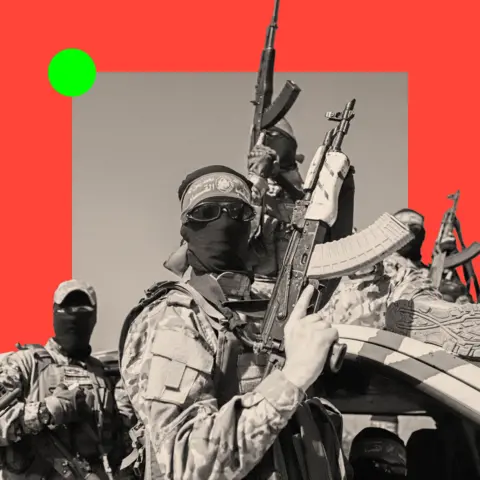 BBC
BBCHow does a group that has governed the Gaza Strip for almost 20 years, ruling two million Palestinians with an iron rod and fighting Israel in repeated wars, suddenly lay down its arms and relinquish control?
Judging by a steady stream of gruesome images emerging from Gaza since the ceasefire came into effect on 10 October, Hamas seems intent on reasserting its authority.
Its masked men, back on the streets, have been seen beating and executing opponents. Impromptu firing squads have dispatched kneeling men they say are members of rival groups, including some of Gaza's powerful clans.
Other victims, cowering in terror, are shot in the legs or beaten with heavy clubs.
Some of those now being attacked by Hamas had been part of groups involved in looting and diverting aid, according to one aid worker I spoke to, exacerbating the humanitarian crisis. The UN has also accused criminal gangs of stealing aid.
This is not yet a world in which, as US President Donald Trump's 20-point Gaza peace plan envisages, Hamas fighters turn over their weapons, submit to an amnesty, leave Gaza and hand over to an international stabilisation force.

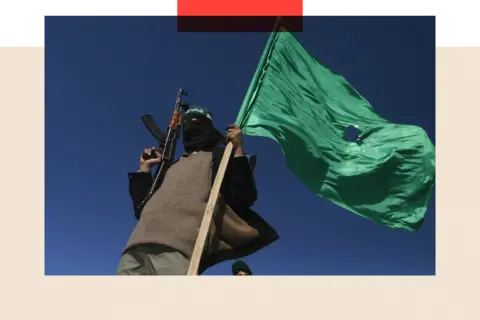 AFP via Getty Images
AFP via Getty ImagesFor his part, President Trump initially seemed ambivalent about the brutality.
On his way to Israel on 13 October, he signalled the US had given Hamas - designated a terrorist group by the US, UK, Israel and others - a green light to restore order.
"We have given them approval for a period of time," he told reporters aboard Air Force One.
Three days later, he hardened his tone. "If Hamas continues to kill people in Gaza, which was not the Deal," he wrote on Truth Social, "we will have no choice but to go in and kill them."
So, where does this situation on the ground in Gaza today leave Hamas?
And ultimately, after two years of war that has resulted in unparalleled suffering for its own people and the violent death of most of its key figures, what, if anything, does the future really hold for the group?
For many Gazans, traumatised and exhausted by two years of perpetual suffering - and a war that has killed 68,000 people in Gaza according to the Hamas-run Health Ministry - this ugly endgame is nerve-wracking, but doesn't come as a surprise.
Of the Gazans I spoke to - among them, aid workers, lawyers, as well as a former adviser to a Hamas leader - each has a different take on the likelihood of Hamas laying down its arms and relinquishing control.
And indeed - given the situation on the ground - whether now is the time for them to do so.

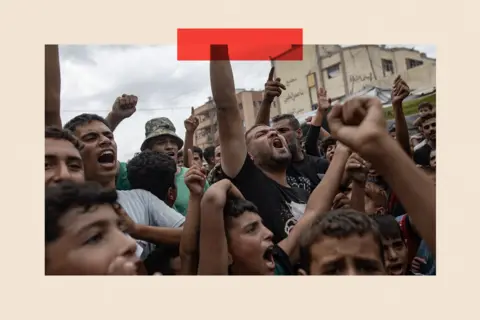 Anadolu via Getty Images
Anadolu via Getty Images"It's been two years with a complete loss of law and order," aid worker Hanya Aljamal says from her home in Deir al-Balah, in the middle of the Gaza Strip. "We need someone to take over.
"As unqualified as Hamas is to rule the Strip, they are a better option than the gangs."
Dr Ahmad Yousef, a former advisor to Ismail Haniyeh, who was Hamas's political leader, is of the opinion that a firm grip is needed at present.
"As long as there are still people who try to take the law into their hands, we need somebody to scare them and squeeze them to the corner," says Dr Yousef, who now runs a Gaza think tank and remains close to the Hamas leadership.

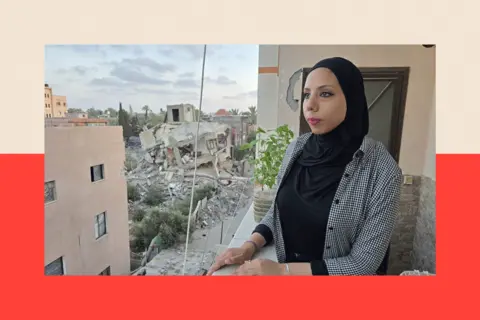
"This will take time. Not a long time. Within a month we will host those police forces and soldiers from Turkey and Egypt," he continues, referring to the international stabilisation force for Gaza, outlined in the peace plan, that could be composed of troops from Egypt and Turkey, among others.
"This is the moment where they will set their guns aside."
Other Gazans are more sceptical, and fearful. Some aren't convinced that Hamas will give up their power - or weapons at all.
Moumen al-Natour, a Gaza-based lawyer imprisoned several times by Hamas, is one of them.

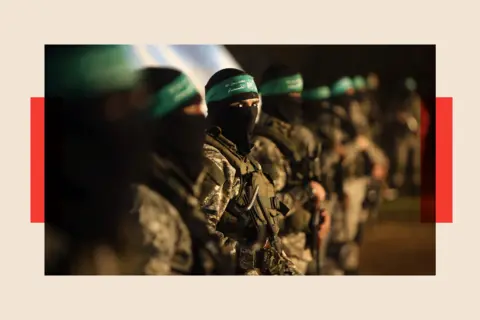 AFP via Getty Images
AFP via Getty ImagesHe has been in hiding since July, when he says masked Hamas gunmen came to his Gaza City apartment and ordered him to report to al-Shifa hospital for interrogation.
"Hamas is [sending] a message to the world and to President Donald Trump… that they will neither relinquish power nor hand over their weapons.
"If I fell into Hamas' hands now, they would make a video and kill me in the street with a shot to the head," he says in one of a series of videos sent to us from an undisclosed location in the Gaza Strip.
The wall behind him is riddled with bullet holes.

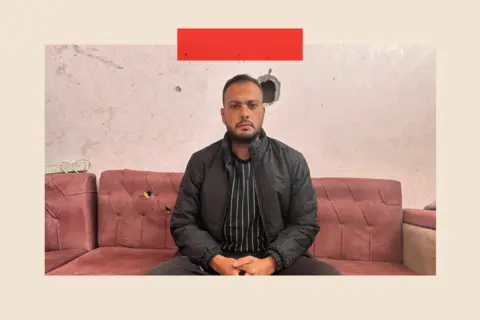
"It is a gang, not a government," he says of Hamas.
"I don't want them to remain in Gaza… I don't want them in government, and I don't want them in security. I don't want to see their ideas spread in mosques, in the streets, or in schools."
Mr al-Natour has his own take on what Gaza could look like.
The disparate array of militias now under Hamas assault could, in his view, be integrated a new security apparatus. But with their competing agendas, sometimes murky pasts and, in some cases, controversial links to the Israeli military, it's a problematic proposition.
"The fact is – and sometimes it's very hard for Israelis to admit this – that Hamas still exists and is the dominant player in Gaza." says Dr Michael Milshtein, a former head of the department for Palestinian Affairs in Israeli Military Intelligence.
"Relying on suspicious players - clans, militias, gangs, many of them criminals, many of them affiliated with ISIS [the Islamic State group], many of them involved in terror attacks against Israel - and considering them as a kind of alternative to Hamas is an illusion."

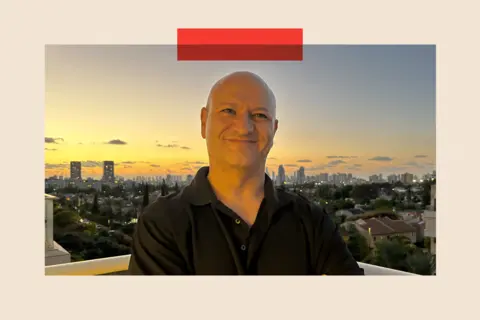
Hamas officials have said the group is willing to hand over political control of Gaza. The Trump ceasefire plan, to which it gave its qualified support, envisages "temporary transitional governance of a technocratic, apolitical Palestinian committee".
But even if the group is willing to step back from a political role – something many Palestinians and Israelis still doubt - persuading its battle-hardened fighters to lay down their weapons is a big step for an organisation whose power, even before October 2023, relied heavily on the force of arms.
To begin to answer the complex question of what may happen to Hamas next requires delving backwards into how exactly it consolidated power in the first place.
From its origins in the 1980s as an offshoot of the Egyptian Muslim Brotherhood and a rival to the secular Palestine Liberation Organization (PLO), Hamas morphed into a violent militant group responsible for the deaths of Israeli civilians.
Initially, Israel offered discreet support to Hamas, seeing it as a useful counterweight to the PLO and its dominant faction, Fatah, led at the time by Yasser Arafat.
"The major enemy was Fatah," says Ami Ayalon, former head of Israel's domestic security service, Shin Bet, "because they were the people who demanded a Palestinian state."
But when Hamas launched deadly suicide bomb attacks in the 1990s and 2000s on Israelis, Israel responded with a series of high-profile assassinations.
A violent power struggle with Fatah left Hamas, which won a 2006 election, in sole control of the Gaza Strip.

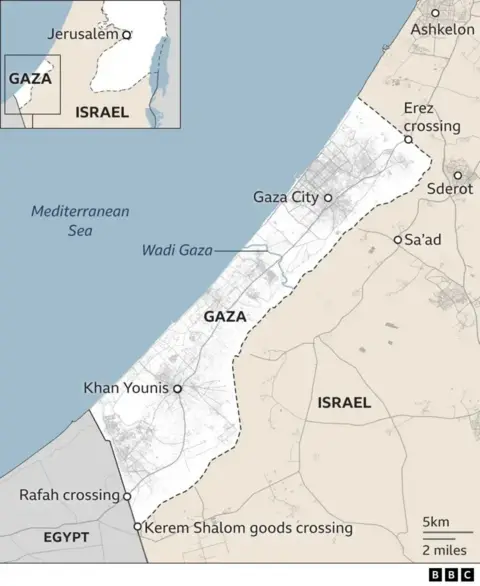
Eighteen years of Hamas rule have followed, characterised by an Israeli military and economic blockade, and bouts of armed conflict in 2008-09, 2012, 2014 and 2021.
Despite Israeli claims since October 2023 that "Hamas is ISIS", the government of Israeli Prime Minister Benjamin Netanyahu has previously convinced itself that Hamas did not pose a strategic threat.
"His was a policy of managing the conflict," says Mr Ayalon. "He said we are not going to solve it and we are totally against the reality of two states, so the only way is to divide and control."
With Hamas in control in Gaza and the Palestinian Authority, led by President Mahmoud Abbas, ruling in part of the occupied West Bank, the Palestinians remained hopelessly divided, enabling Israel to argue that it had no unified leadership to negotiate peace with.
"[Netanyahu] did everything in order to support Hamas in Gaza," Mr Ayalon says. "He let Qatar send them… more than $1.5bn."

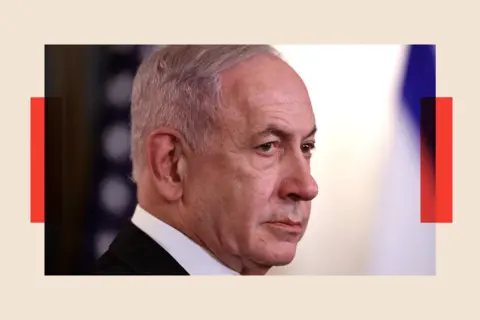 Getty Images
Getty ImagesThe money from Qatar was meant to pay the wages of civil servants and support the poorest families, but security chiefs feared it was being used for other purposes.
Mr Ayalon adds: "It was clear to the director of the Shin Bet and the head of Mossad that this money would go to military infrastructure.
Netanyahu has defended allowing payments to Hamas, saying it was meant to aid the civilian population.
As 7 October brutally revealed, Hamas was always preparing for war. Nowhere was this more obvious than in its elaborate network of tunnels.
Tunnels had already been used to mount attacks on Israeli army positions during the second Palestinian uprising, or "Intifada" that began in 2000.
In 2006, Hamas fighters used a tunnel under the border with Israel to attack a military post near Kerem Shalom, killing two Israel soldiers and kidnapping a third, Gilad Shalit.
He was held for five years until his release, in 2011, in exchange for 1,027 Palestinian prisoners, including Yahya Sinwar, who would go on to mastermind the Hamas attacks of October 2023.

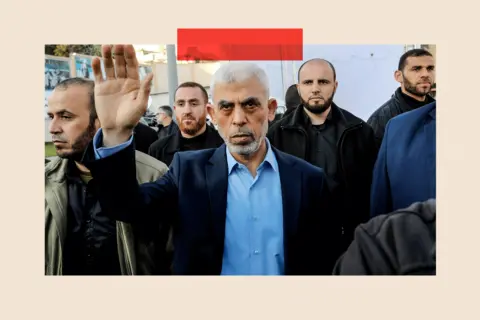 Getty Images
Getty ImagesOver time, Hamas' tunnel network expanded, to include workshops, weapons-manufacturing sites and command centres.
Regional developments also played a role. In 2012, after the fall of the Libyan dictator Muammar Gaddafi and the brief rise to power of the Muslim Brotherhood in Egypt, Hamas was able to smuggle increasingly sophisticated weapons into Gaza, including sniper rifles, mobile rocket launchers and equipment for the manufacture of long-range rockets.
Hamas is thought to have benefitted from the help of technicians and fighters with experience of tunnelling in places like Lebanon and Iraq.
Iran was also a key supporter, seeing Hamas as a natural component in its "Axis of Resistance," a loose coalition of militant groups across the Middle East with a shared antipathy towards Israel and the United States.
In 2020, a US State Department report said that Iran was providing around $100m a year to Palestinian militant groups including Hamas.

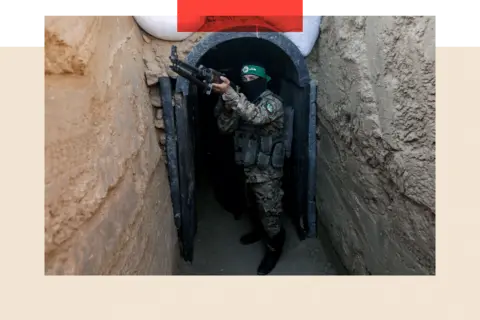 Yousef Masoud/SOPA Images/LightRocket via Getty Images
Yousef Masoud/SOPA Images/LightRocket via Getty ImagesSome tunnels were reportedly dug as deep as 230ft (70m) below ground, took years to build and cost tens of millions of dollars each. These were designed to protect senior Hamas commanders and house long-range weapons.
A local expert with extensive knowledge of the tunnels told the BBC the cost of the entire project totalled roughly $6bn (£4.5bn).
Precise figures are hard to come by, but it's thought that the scattered network extended for as much as 250 miles (400km), in a strip of land just 26 miles long and, at its widest, seven miles across.
Public discussion of the tunnels - their location or cost - could expose Gazans to accusations of espionage, leading to arrest and worse. But many knew what was happening.
Local residents would see the tell-tale signs: sand and clay being removed, new entrances appearing unexpectedly and machinery being brought in under cover of darkness.
What began as an opportunistic response to Gaza's isolation became, over the span of three decades, a multi-layered subterranean industrial and military complex.
It emerged later that much of it was concealed under Gaza's civilian infrastructure, including hospitals, schools and, in the case of a tunnel containing a Hamas data centre, the headquarters of the UN Relief and Works Agency (UNRWA) in Gaza City.

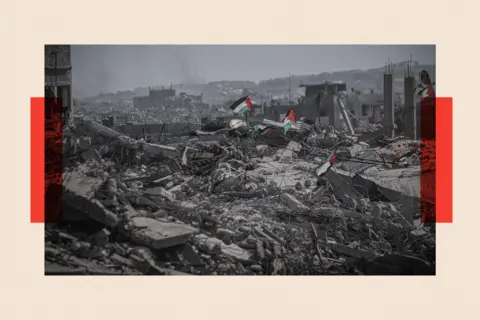 Anadolu via Getty Images
Anadolu via Getty ImagesAfter 7 October 2023, when Hamas fighters stormed into Israel, killing around 1,200 people and taking 251 hostage, it also became a massive underground prison. Not all of those held hostage were concealed in tunnels, but many were, especially as the war ground on.
Eli Sharabi, who became one of the most high profile of those taken, was first moved from a safe house into a tunnel after 52 of his 491 days in captivity.
"They tied us with ropes in our legs and hands," he told the BBC earlier this month. "I fainted from time to time from the pain. One time they broke my ribs."
By the time he was released, in February, he had lost more than 30kg (4st 10lb).

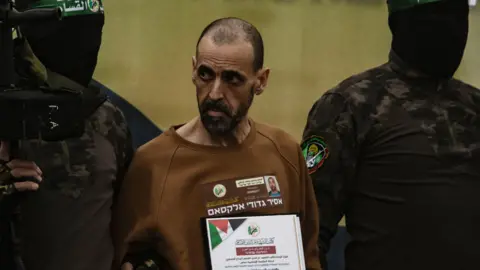 EPA
EPAHamas used the hostages as bargaining chips, to secure ceasefires or the release of Palestinians held in Israeli prisons. As negotiations over their fate continued, Hamas drip fed the Israeli public with a cruel series of videos, often showing the hostages in situations of extreme distress.
Eventually it was, says Dr Yousef, internal and external pressure that forced Hamas to abandon the strategy.
"Qatar, Egypt and Turkey and also the people here in displacement camps sent a strong message to Hamas leaders outside that enough is enough."

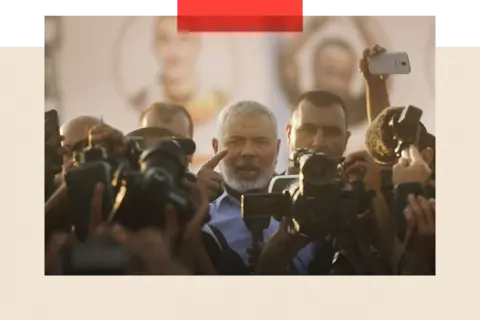 Getty Images
Getty ImagesIn the meantime, Israel continues to destroy what it can of the tunnel network, often demolishing civilian neighbourhoods above in the process.
And the job is far from done.
"According to publications from the defence establishment, estimates speak of damage to between 25% and 40% of the tunnels," says Yehuda Kfir, an Israeli civil engineer and underground warfare researcher at Haifa's Technion University.
"No doubt [Hamas] aspires to rehabilitate the infrastructure, including restoring tunnels that were dealt with in various ways by the IDF."
Restoring tunnels is one thing. Reconstituting the organisation is another. After the events of the past two years, Hamas' leadership is in tatters.
Israel has gone to enormous lengths - in Gaza, Iran, Lebanon and Qatar - to eliminate the group's key political and military figures.
From its best known, internationally recognisable leaders, travelling the world to promote their cause, to its battalion commanders on the ground in Gaza, Hamas has lost almost everyone of consequence.
Israel assassinated Hamas's powerful leader, Ismail Haniyeh, in Tehran in July 2024.
Three months later, Haniyeh's successor, the elusive Yahya Sinwar, was killed in the ruins of a house in Rafah.

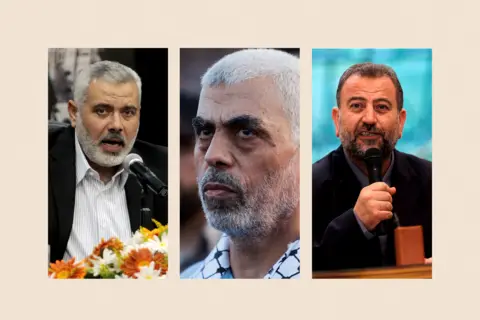 Reuters
ReutersDespite the loss of these leading figures - and thousands of members of its armed wing - the group battled on, recruiting a fresh generation of radicalised young fighters and splintering into small cells intent on carrying out hit-and-run guerrilla-style operations.
But Hamas in October 2025 is a pale shadow of the organisation that carried out the attacks of 7 October. Today's leaders are less well known and, crucially, have little political experience.
Ezzedine al-Haddad, who is 55, now heads the five-member military council that commands Hamas' armed wing, the Izz al-Din al-Qassam Brigades.

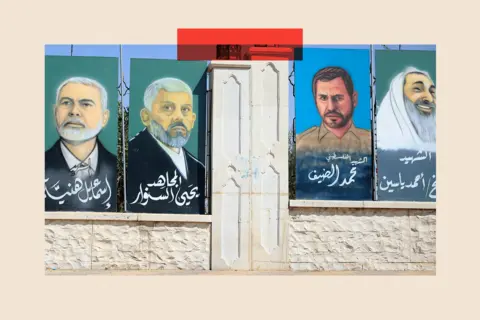 EPA/ Shutterstock
EPA/ ShutterstockOutside Gaza, the remnants of the group's political leadership include Khaled Meshaal (the subject of a botched Israeli assassination attempt in Jordan in 1997), Khalil al-Hayya and Muhammad Darwish.
All are believed to have escaped death on 9 September, when Israeli jets attacked a building in Doha, Qatar, where they were meeting to discuss the latest US ceasefire proposals.
Despite the violence still raging in Gaza, the former Hamas adviser, Ahmed Yousef, says the group is tired of war.
Without mentioning 7 October directly, he describes the cause of the war as a "terrible mistake" and that a "different approach" is needed.

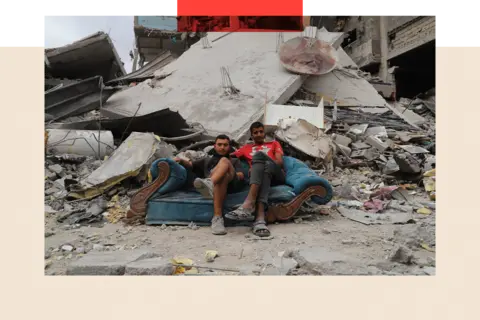 Anadolu via Getty Images
Anadolu via Getty Images"I'm talking to many of them and they have said that they are not interested in ruling Gaza anymore," he says.
"But Hamas has more than 100,000 members and those people are not going to disappear."
Hamas, he suggests, is looking to rebrand itself in order to continue to play a political role in the future, a process he likens to the ANC's transition from guerrilla warfare to political rule in post-apartheid South Africa.
"If tomorrow there [are] elections," he says, "I'm sure Hamas will come under different names, giving the impression it is more peaceful and more willing to be part of political life.
"Violence is not going to be part of any political party."
Dr Milshtein is doubtful.
"Even if there will be a new local regime in Gaza, of course behind the scenes Hamas will be the dominant player," he argues.

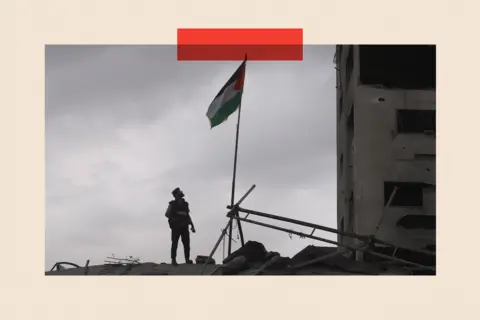 Anadolu via Getty Images
Anadolu via Getty ImagesDisarmament, he continues, is even less likely: he predicts another Gaza war within the next five years.
But Ami Ayalon, the former Shin Bet chief, believes Israel should find another way to tackle its enemy.
"Unless we defeat the ideology, they will flourish," he says.
"The only way to defeat the ideology is by creating and presenting to the Palestinian and the Israeli people a new horizon. A horizon of two states."
For now, that horizon does not exist, perhaps making Dr Milshtein's prediction more likely than Ami Ayalon's vision of a shared future.
But Hamas, however diminished, is far from a spent force. One way or another, Israel may have to deal with it for some time to come.
Top picture credit: Getty Images


BBC InDepth is the home on the website and app for the best analysis, with fresh perspectives that challenge assumptions and deep reporting on the biggest issues of the day. You can now sign up for notifications that will alert you whenever an InDepth story is published - click here to find out how.
Demolition has begun on part of the East Wing of the White House in preparation for the construction of US President Donald Trump's new ballroom.
Construction crews on Monday tore down massive chunks of a covered entryway and windows in the East Wing, which Trump said is being "fully modernised".
The president previously said that his $250m (£186m) White House ballroom addition would be "near" the existing structure but would not change it.
"It won't interfere with the current building. It won't be. It'll be near it but not touching it - and pays total respect to the existing building, which I'm the biggest fan of," Trump said in July. "It's my favourite. It's my favourite place. I love it."
Trump announced the construction in a social media post, saying "ground has been broken" on the "much-needed" ballroom space.
"For more than 150 years, every President has dreamt about having a Ballroom at the White House to accommodate people for grand parties, State Visits, etc," he wrote.

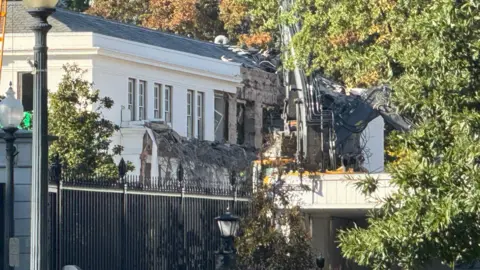 BBC/Bernd Debusmann Jr
BBC/Bernd Debusmann JrHe said the project is being privately funded by "by many generous Patriots".
The White House has served as the historic home of the US president for two centuries. The East Wing was constructed in 1902 and was last modified in 1942.
From the south side of the building, the BBC saw several large pieces of construction equipment - some adorned with US flags - near the East Wing.
Trump wrote in his post that the East Wing was "completely separate" from the White House, though it is attached to the main structure.
The covered entryway, which spans much of the East Wing's south side, appeared to be being gutted, with concrete debris and metal cables clearly visible from several hundred meters.
The activity had attracted a small number of curious onlookers who stopped to ask photographers and reporters what was going on.
One woman, who was wearing a surgical mask and a sign with an anti-Trump slogan on it, expressed her dismay. She did not identify herself.
"I don't like it," she said - seemingly speaking to nobody in particular - as she gestured at the White House from behind a yellow van that was parked nearby. "Look what he's doing to it!"

 Getty Images
Getty ImagesMany of the world's largest websites, including Snapchat, Reddit and Roblox, were knocked offline on Monday after a huge Amazon Web Services (AWS) outage.
More than 1,000 apps and websites - including banks such as Lloyds and Halifax - were impacted by problems at the heart of the cloud computing giant's operations in the US, according to platform outage monitor Downdetector.
It said reports from users of problems globally had soared to more than 6.5 million during the outage on Monday morning.
While Amazon said it had resolved the outage by 12:00 BST, experts say it demonstrates the perils that come with lots of companies relying on a single, dominant provider.
"What this episode has highlighted is just how interdependent our infrastructure is," said Prof Alan Woodward of the University of Surrey.
"So many online services rely upon third parties for their physical infrastructure, and this shows that problems can occur in even the largest of those third-party providers.
"Small errors, often human made, can have widespread and significant impact."
The issues appear to have begun at around 07:00 BST on Monday, as users began to report problems accessing a slew of platforms.
This included a wide range of different sites and services, from massive online games like Fortnite to the language-learning app Duolingo.
Downdetector told the BBC it had seen more than four million reports from users across 500 sites within just a few hours - more than double the amount it would see across an entire regular weekday.
These later peaked at more than six million, it said, as more services including Reddit and Lloyds Bank attempted to recover.
At around 11:00 BST, Amazon said most of its affected services had recovered.
Amazon has not yet fully detailed what caused Monday's outage or issued an official statement regarding it.
It said in an update on its service status web page the issue "appears to be related to DNS resolution of the DynamoDB API endpoint in US-EAST-1".
DNS, which stands for Domain Name System, is often likened to a phone book for the internet.
It effectively translates the website names people use (like bbc.co.uk) into numbers which can be read and understood by computers.
This process basically underpins the way we use the internet, and disruptions to it can leave web browsers unable to locate the content they are looking for.
Matthew Prince, chief executive of Cloudflare, told the BBC the AWS outage highlighted the power cloud services have over how the internet works.
"Everyone has a bad day, today Amazon had a bad day," he said.
"There are amazing things about the cloud, it allows you to scale… but if you have an outage like this it can take down a lot of services we rely on."
And Cori Crider, head of the Future of Technology Institute, told the BBC it was "a bit like a bridge collapsing".
"An essential part of the economy has fallen to pieces," she said.
And with so much of cloud computing relying on Amazon, Microsoft and Google - estimated at around 70% - she said the status quo was "unsustainable".
"Once you have a concentrated supply in a handful of monopoly providers, when something like this falls over, it takes a huge percentage of the economy out with it," she said.
"We should really look at trying to buy more local services, rather than relying on a handful of American monopoly platforms.
"That's a risk to our security, our sovereignty and our economy and we need to look at structural separations to make our markets more resilient to these kind of shocks."
Additional reporting by Esyllt Carr.


Sign up for our Tech Decoded newsletter to follow the world's top tech stories and trends. Outside the UK? Sign up here.

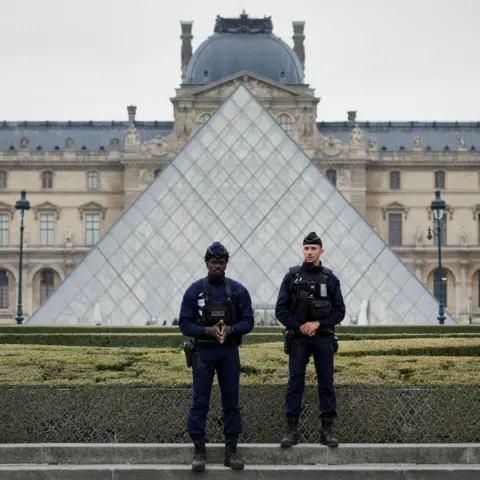 Getty Images
Getty ImagesFrench police are desperate to retrieve priceless jewels stolen from the Louvre in a brazen daylight robbery, but experts have warned it may already be too late to save them.
In Paris on Sunday, thieves broke into the world's most-visited museum, stealing eight valued items before escaping on scooters, in a daring heist that took about eight minutes.
Dutch art detective Arthur Brand told the BBC he feared the jewels may already be "long gone", having been broken up into hundreds of parts.
It is highly likely the pieces will be sold for a fraction of their worth and smuggled out of France, other experts have said.

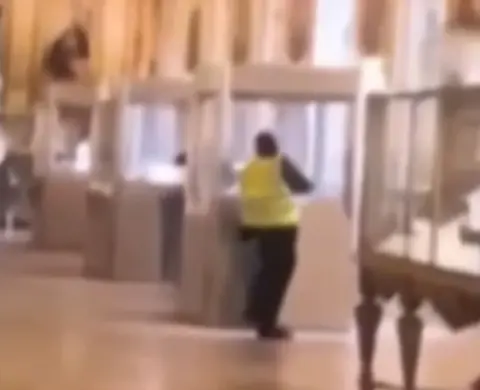 BFMTV
BFMTVThe group were professionals, Mr Brand believes, as demonstrated by the fact they were in and out of the Louvre so quickly.
"You know, as a normal person, you don't wake up in the morning thinking, I will become a burglar, let's start with the Louvre," he said.
"This won't be their first heist," he said. "They have done things before, other burglaries. They are confident and they thought, we might get away with this, and went for it."
In another sign the professionalism of the gang is being taken seriously, a specialist police unit with a "high success rate in cracking high-profile robberies" has been tasked with tracking them down.
Authorities have said they suspect the heist is linked to an organised crime network. Mr Brand says it means the perpetrators will likely have criminal records and be known to the police.
Organised crime groups like these generally have two objectives, Paris prosecutor Laure Beccuau said. "Either to act for the benefit of a sponsor, or to obtain precious stones to carry out money laundering operations."
Mr Brand thinks it would be impossible to sell the items intact, and he said stealing-to-order for a private collector is something that only happens in Hollywood films.
"Nobody wants to touch a piece so hot," he explained. "You cannot show it to your friends, you cannot leave it to your children, you cannot sell it."

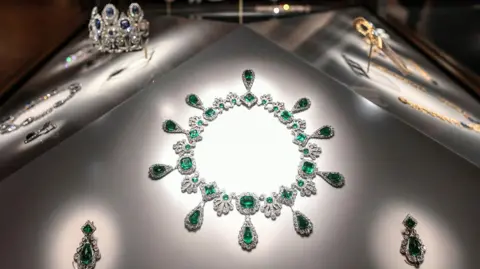 Getty Images
Getty ImagesMr Brand believes the objects will be dismantled and broken up, with the gold and silver melted down and the gems cut up into smaller stones that will be virtually impossible to track back to the Louvre robbery.
Jewellery historian Carol Woolton, who presents the podcast If Jewels Could Talk and was Vogue magazine's jewellery editor for 20 years, told the BBC the robbers had "cherry-picked" the most important gemstones from the Louvre's collection.
The "beautiful large flawless stones" would likely be dug out of their mountings and sold, she said, except for the crown from Empress Eugénie which has smaller stones set in it and was "too hot to handle", she added.
This could explain why it was dropped during the escape, along with one other item, and found by authorities.
Empress Eugenie's tiara, which was stolen, has rare natural pearls which have a very large value, experts say.

 Louvre Museum
Louvre Museum
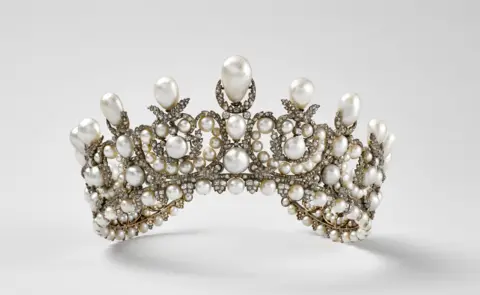 Louvre Museum
Louvre MuseumWhile the items have been described as being priceless, Ms Woolton expects them to be sold for a fraction of their worth.
"They will go to someone who is willing to handle these," she said. "Everyone will be looking for these – they will take what they can get."
How much exactly could they fetch in money if sold on? When asked about the potential value of the haul, Mr Brand said the cut-up parts could be worth "many millions".
The gems and gold stolen could fetch up to £10 million (€11.52m; $13.4m), says Tobias Kormind, managing director of 77 Diamonds, an online jeweller.

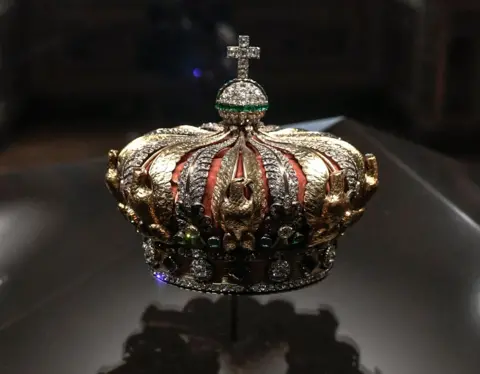 Getty Images
Getty ImagesHe told the BBC the gang would need a skilled expert to remove the gems, and a professional diamond cutter to change the larger recognisable stones.
Smaller stones that were not easily identifiable could be sold immediately and while it was hard to tell the exact price of all the stones stolen, the larger ones could be worth around £500,000 each, he said.
"There are at least four of that size, so adding all of those up plus the gold, you are probably approaching £10m," he said.
"The diamond and gemstone market is liquid and there are many buyers on the fringes that don't ask too many questions."
There are hopes that the items could reappear intact one day - but those hopes are narrowing as the days pass.

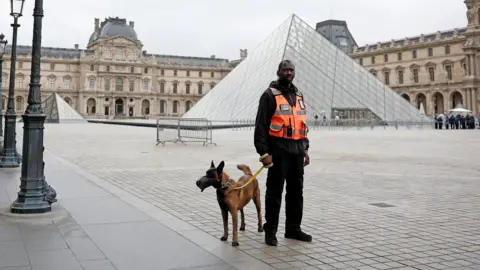 Reuters
ReutersThere is a precedent - the Cartier exhibition at the V&A Museum features an item of jewellery stolen in 1948 before reappearing in an auction several decades later.
What is certain is many in France are deeply shocked by the Louvre heist, having felt an emotional attachment to the jewels.
"We don't necessarily like jewellery because it's a question of power, and that doesn't necessarily have a good connotation in France," Alexandre Leger, head of heritage at French jeweller Maison Vever, said.
"But inevitably, what was stolen belonged as much to you as it did to me. It belongs to France, so everyone owns a little piece of these objects, just as everyone owns a little piece of the Mona Lisa.
"It's as if someone had stolen the Mona Lisa from us... Someone stole France."
Additional reporting by Izumi Yoneyama.
From the White House on Monday, US President Donald Trump waxed lyrical about his country's friendship with Australia.
"We've been long-term, longtime allies and I would say there's never been anybody better," Trump told Australian Prime Minister Anthony Albanese, at the pair's first official meeting.
"We fought wars together and we never had any doubts," he said.
Australia though, for arguably the first time in its history, is feeling some creep in.
The US has historically been seen as its best friend, the ultimate ally.
Before Albanese hopped on his flight to Washington for the meeting - which he's been desperately trying to organise for months - he said it was an important opportunity to "consolidate and strengthen" the connection.
"Australia and the United States have stood shoulder-to-shoulder in every major conflict for over a century," he said in a statement.
But in a world order which challenges Washington's dominance, and under an administration which is stretching many of its ties, Australia is casting a more critical eye on the relationship.
"The Trump administration is clearly fraying some of those long-held, unexamined beliefs about the reliability of the United States as an ally," Sam Roggeveen, from Australia's Lowy Institute think tank, told the BBC.
Trump's first term was a challenge for Australia – and few here expected his second would be much different. An election campaign earlier this year was in many ways hijacked by the question of how each prospective prime minister would deal with the president.

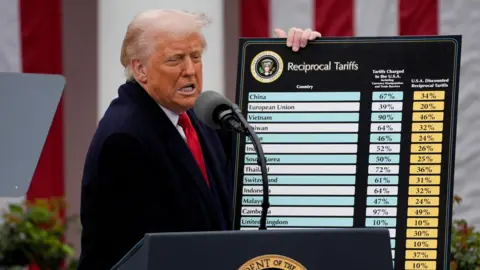 EPA
EPATrump has frustrated Australia with his sweeping tariffs scheme, imposing an import tax of 10% on most of its goods - 50% for aluminium and steel - something seen as a breach of a decades-long free trade agreement.
"This is not the act of a friend," Albanese said at the time.
Then came a review of the landmark Aukus defence pact, announced in June to jolts of panic in Canberra.
Outwardly, the Albanese government didn't waver in professing its confidence that the agreement - which will give Australia cutting-edge nuclear submarine technology in exchange for help countering China in the Asia-Pacific - would go ahead. It is natural for a new government to review their predecessor's decisions, it said.
But the White House's isolationist rhetoric - along with the fact that the US is facing challenges in its own submarine supply - made some nervous that the deal may be cancelled or rewritten, threatening to leave Australia vulnerable with trouble brewing on its doorstep.
And then there was Albanese's long battle to secure a meeting with Trump – interpreted by parts of the Australian parliament and the country's media as a snub.
An awkward encounter between Defence Minister Richard Marles and his US counterpart Pete Hegseth earlier this year didn't help. Marles had met Hegseth in August to lobby him on Aukus, but the latter's office issued - and later retracted - a statement saying there were no talks, only "a happenstance encounter".

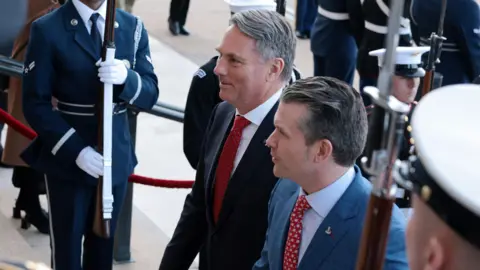 Getty Images
Getty ImagesUltimately the meeting on Monday went as well as it possibly could have for Albanese.
He leaves the White House with both Trump's praise and a deal promising US investment in developing Australia's critical minerals industry, which is hoped will help the nation break China's near monopoly of that market.
Albanese also got a renewed commitment to Aukus, in effect ending the dragged-out review.
He didn't receive a public dressing down – though Kevin Rudd, a former prime minister who was critical of Trump before taking up his current post as ambassador to the US, was awkwardly confronted with the president telling him "I don't like you either".
The tariffs remain a gripe but are at the lowest rate of any country, and in fact some Australian sectors, like beef, appear to be benefitting from the global upheaval.
And though the Aukus review was a scare it was ultimately a false alarm.
But all of this and other factors, such as Trump's unpredictable treatment of other allies, has fuelled increased distrust of the US.
"For the first time in my lifetime, one of our two major political parties benefited in the last election from slightly distancing itself from the US," Mr Roggeveen said of Albanese.
The numbers vary, but polling has consistently showed Trump is unpopular here, and fewer Australians believe America is a reliable ally under his leadership.
And yet the latest poll found that, nevertheless, about half of Australians think the nation needs its alliance with the US more than ever.
"It's one thing to say Donald Trump is difficult, Donald Trump is unpopular. It's another thing to come up with an alternative to the US right now," the United States Studies Centre's Jared Mondschein told the BBC.
"That's really due to Xi Jinping. In many ways, he's the gift that keeps on giving for the US in Asia."
Ahead of the meeting in Washington on Monday, a run-in between jets from the Chinese and Australian militaries served as a reminder of tensions in the region.
Beijing, which is Australia's biggest trading partner, has embarked on a huge military build-up and it's making Canberra, and a whole host of others, nervous.
Mr Roggeveen says there is a belief amongst Australia's political and security experts that the country cannot defend itself independently, if it comes to that - though he is among a small cohort which disagrees.
Many point to Pacific nations as a critical line of defence - something reflected in Australia's keenness to lock as many as possible into alliances - while a few voices argue China is in fact a potential security partner, not a threat.
"But there's a view... that the only reasonable course for Australia is to seek closer and closer relations with the United States," Mr Roggeveen says.
"A lot of allies and partners throughout the region are grabbing for the uncertainty of a term-limited Trump administration over the certainty of a Xi Jinping-led China," Mr Mondschein adds.
So while the way Australians feel about the US is changing, it is hard to see it greatly straying from the path it is on any time soon.
中国广东省江门市称,已取得基孔肯雅热疫情低水平散发的阶段性目标,有利于早日实现疫情动态清零。
据中新网报道,江门市人民政府新闻办公室星期二(10月21日)发布消息称,经国家和广东省驻江门工作组联合分析研判认为,19日和20日江门新增报告基孔肯雅热确诊病例数已降至50例左右,取得了疫情低水平散发的阶段性目标,有利于早日实现疫情动态清零目标。
此前,广东省疾控中心传染病预防控制所所长、传染病防控首席专家康敏指出,江门市基孔肯雅热疫情在波动下降,广东省仍处于蚊媒活跃期,存在疫情传播风险,防控工作仍不能松劲。
江门在全市范围内开展以防蚊灭蚊为核心、以清理孳生地为重点、为期两周的爱国卫生运动专项行动。
江门市疾控中心病媒生物预防控制部副部长朱宇平说,全民动员、彻底清理孳生地是有效阻断蚊媒病毒传播的重要措施,请市民持续做好环境清理,并做好个人防护。
日本警方星期二(10月21日)拘捕一男三女,指他们涉嫌将重约8公斤的沙状黄金藏于内裤,由香港走私入境。
据网媒“香港01”引述日媒报道,东京警视厅调查人士称,被捕疑犯分别为居于埼玉县草加市的34岁男子西村昌盛,以及三名年龄介于20至30多岁的女子,她们的具体信息警方并未透露。
警方称,西村作为主脑指示三名女疑犯,去年7月将沙状黄金藏于内裤及胸罩里,再由香港乘坐飞机抵达东京羽田机场。
四人被捕后,已向警方承认罪行。
《纽约时报》2017年的一篇报道称,日本入境黄金走私以惊人速度增长。
报道引述日本警方称,走私的黄金来自购买时无需交税的地方,比如香港或澳门。走私者会让自己的货物避开海关人员视线,避缴日本对进口黄金的征税。
在日本,走私黄金通常会被卖到当铺或以现金换黄金的店铺里,这些店铺会向卖方支付黄金的价款外加消费税,这是获利关键,即走私者可获取8%(当时的消费税)收益。
日本在2019年10月将消费税上调至10%。

© Eugene Hoshiko/Associated Press
Never take file attributes such as datestamps at face value. It’s only too easy to pull tricks by changing the system clock, and it’s straightforward to construct a bogus file with a made-up history.
In my case, I had a genuine excuse for a little gentle fabrication. As I’ve explained before, I use the saved versions of source code files I edit in Xcode to revert changes and similar. In this case, I wanted to merge and clean up saved versions in two copies of what would have been the same file, part of the source of LogUI. A couple of times during its development I have forked my source, and in this case have two files, one containing all the changes I made up to last summer, and the other with all those made since.
The first contains 120 saved versions dating back to the initial version on 8 July 2024, listed here in Revisionist.
The second took those on from 7 June 2025 up to last weekend, for LogUI build 77, released yesterday.
Some of the 130 versions were duplicates, so for efficiency I wanted to remove those and join the two sets of versions into one. I therefore dragged and dropped those two files onto Versatility, which saved all their versions into two folders. I then merged those into a single folder containing the versions I wanted to keep.
When Versatility reassembles those into a single file, it adds each version in numeric order, ignoring any gaps in numbering. As the version files from the first were numbered from 000 to 119, all I had to do was renumber those from the second from 200 to 209, put them into the same folder, and remove duplicate versions identified from Revisionist’s listings of the original versions.
When I dropped that composite folder onto Versatility it composed them into a single file, with 98 versions stretching from 8 July 2024 to 18 October 2025.
The date of creation of that file, which was actually 19 October 2025, is given as 7 June 2025, with a date of last modification a day before it was really created.
There, in that brand new file, are those 98 versions going right back to the first 15 months ago, each safely tucked away in the macOS version database. The version files from the first of the two source code files each have creation dates of 8 July 2024, although the Mac mini M4 Pro they are now stored on didn’t exist until that October, and its first macOS was installed on 1 November 2024.
Versatility and Revisionist are both available from their Product Page.

© Nathan Howard for The New York Times

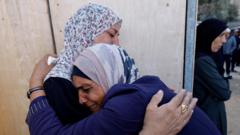
这些场景用公共交通、打车、租车(甚至专车)往往更舒服、更省钱。
以上仅限一二线啊,小地方车子的方便程度确实更高。
昨天的买车热帖里面看到了一个眼前一亮的说法:
叫你不买车的很多都是没车的,甚至驾照都没有。 你能问出什么答案? 你应该问买了车的, 你愿意将车卖掉,然后自己打车或者坐高铁吗? 这才是真实答案。
V 站上凡是问要不要买车的帖子下面,反复会出现“不如打车”这类的说法。算经济账来看,当然是不买更合算,但是有车之后的隐性收益很难算经济账来评估
我感觉上面这个说法可以作为一个金标准:找一个和自己处境基本上类似的人,让他想一想是否愿意把车卖掉,然后给他等值的现金。答案基本上就会被客观与主观感受全部结合考虑了


中国可重复使用火箭朱雀三号顺利完成加注合练及静态点火试验,进入首飞准备阶段。
据央视新闻报道,此次试验覆盖了火箭整箭水平转运及起竖、推进剂加注、发动机点火及牵制、推进剂泄出等全流程操作,全面检验了火箭首飞各系统及与发射场系统的匹配性。
目前,朱雀三号正按计划实施星罩组合体垂直吊装对接演练,随后将返回技术区,为正式入轨发射及一级回收开展各项准备。
朱雀三号是中国面向大型星座组网任务自主研制的一款大运力、低成本、可重复使用的大型液体运载火箭,采用不锈钢作为箭体主结构材料。
火箭一二级箭体直径4.5米,整流罩直径5.2米,全箭长66.1米,起飞质量约570吨,起飞推力超过750吨,可在执行轨道发射任务后自主高精度返回,在回收场实现软着陆并重复使用。
中共四中全会举行之际,台湾国安会秘书长吴钊燮星期二(10月21日)在一场研讨会上说,比起解决自身紧迫的经济和社会问题,中国大陆更热衷于寻求全球扩张。
综合路透社、联合报和自由时报报道,吴钊燮在台湾陆委会举办的国际研讨会上致辞说,台湾不是大陆唯一锁定的目标,大陆军事扩张已经延伸到第一岛链以外。不过台湾不怕大陆的文攻武吓,因为背后有强大伙伴的支持。
吴钊燮说,中共四中全会正在举行,但新闻重点不在于政策措施,而是上层领导人物动态。他说,“尽管中国大陆经济存在令人担忧的趋势,但最近的新闻并不是关于大陆领导层如何拿出有效或大规模的方案,以摆脱经济低迷,而是关于清洗解放军高级将领的消息。”
中国大陆国防部上周通报,中共中央军委副主席何卫东、军委政治工作部原主任苗华等九名解放军将领“涉嫌严重职务犯罪”,被开除党籍、军籍。何卫东也成为首个落马的二十届中共政治局委员。
吴钊燮认为,大陆军事扩张已经扩及第一岛链以外,今年在没有通知下,解放军就在澳洲周边进行演习,更在第一岛链和第二岛链之间军演,并跟伊朗合作,在美国眼中已经更具有威胁性。
他说,台湾位于第一岛链前线首当其冲,可以看到台湾的海底电缆常被剪断,并遭到灰色地带作战,即大陆会用威胁和诱骗方式来进行扩张。
吴钊燮还说,中国大陆持续对台进行威吓动作,进行混合作战,有各种的资安攻击和错假信息,甚至介入台湾的选举,也在政府与民众之间布下怀疑的种子,更运用AI工具进行各种认知作战。
他说,台湾秉持“四个坚持”,不会主动挑衅,也会扮演印太地区负责任的角色。目前台湾国防预算占GDP的3%,到2030年将提升到5%,会让台湾做好备战的准备,台湾绝对有强烈决心来捍卫自己。
对于国民党主席当选人郑丽文有意赴大陆与中共总书记习近平见面,台湾行政院长卓荣泰说,希望她到时候能拿出竞选时的力道。
据联合新闻网报道,台湾立法院会星期二(10月21日)施政总质询,卓荣泰会前接受媒体联访。
卓荣泰说,民间团体跟对岸任何交流,只要合法合规,政府不会禁止。
卓荣泰说,如果有机会的话,盼郑丽文能够在“中华民国”主权不被侵犯、剥夺,且不会改变台湾人民自由民主生活方式的前提下,与习近平见面,“我倒期待她拿出日前赢过中国国民党五位主席候选人的力道”。
国民党主席选举由出身绿营的前立委郑丽文当选,习近平星期天以中共总书记身份发出贺电,内容提及期望两党坚持共同政治基础,深化交流合作,促进共同发展,推进国家统一等。
郑丽文星期一说,收到习近平的贺电,通关密语就是“九二共识、反对台独”,并表态愿意赴中国大陆与习近平会面。
她强调,国民党希望两岸和解合作,这绝对是主流民意,“大家已经认知到赖清德的两岸政策是死胡同,抗中牌已彻底失灵,六成民众已经反感、不想再玩这套。”

